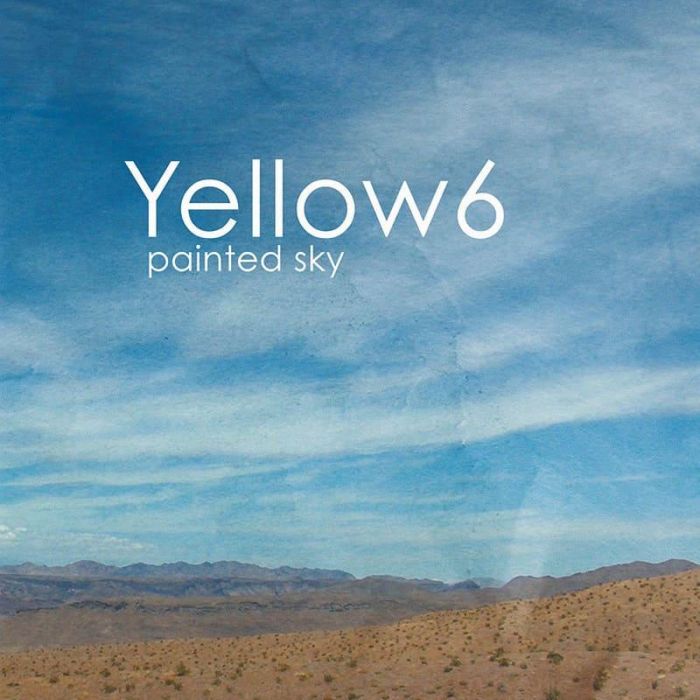Painted Sky by Yellow6 (Review)

We’re halfway through March here in Nebraska, and we’re finally on the cusp of spring, though just barely. As any resident of the state will tell you, noone here really, truly believes that spring has truly sprung until we’re approximately halfway through May. Blame it on a cynicism influenced by unpredictable weather patterns, but I’m keeping my heavy coat nearby, just in case Mother Nature decides to dump another blizzard on us as a nasty little April Fool’s joke.
And so, it only makes sense that Yellow6’s latest, Painted Sky, is coming out this time of year. Don’t let that summery, desert blue sky on the CD cover fool you for a moment. Jon Attwood’s wintry dronescapes are still heavily present throughout the disc’s ten songs.
It’s often contended that Yellow6’s music is too wintry, too sparse, and too stark. The things that can make the music so captivating and arresting are often the very same things that make it laborious and tedious. Oftentimes it depends on your mood, true enough, and so if you’re not in the mood for some of the slowest, darkest post-rock this side of Labradford and The Curtain Hits The Cast-era Low, you should probably steer clear of Yellow6’s music in general, and Painted Sky in particular.
But from time to time, Attwood’s intensive goal of seeing just how far he can extend the spaces between his guitar notes, how glacially he can pace his songs’ rhythms, how much tension he can wring from each note and icy programmed beat threatens to break his songs in two. It’s somewhat maddening, because this approach is used on nearly every single song, with little variety in the method. Individual songs might be lovely, but the cumulative effect can be, well, a bit of a drag.
The opening track, “I Know I Shouldn’t (But I Do),” nears eight minutes as Attwood slowly wring out stark notes from his guitar in a manner that firmly recalls early Low. However, no lovely Alan Sparhawk/Mimi Parker harmonies glide in to offset the gloom. Instead, a keening, high-pitched drone flutters about in the background, conjuring up images whitewashed concrete rooms and abandoned streets — images that becomes even clearer once the funereal drums kick in.
“I Loved You More Before I Knew You Loved Me” comes closest to matching the desert imagery depicted on the album cover, with its wheeling drones, Morricone-esque progression, and creeping bassline reminiscent of Mi Media Naranja’s finest moments.
The album’s loveliest and most haunting moments come during “Pleasure/Pain” and “Eighteen Days,” the album’s two longest tracks (and the moments on the disc that might be the most grueling for some).
“Pleasure/Pain” starts off slowly, with foreboding drones and only the most forlorn of plucked guitars. Things start coalescing after a minute or so, as a mournful drone surfaces from somewhere beyond the event horizon and scuds across the song’s grey, wintry atmosphere while Attwood pulls notes from his guitars at a sorrowful, elegiac pace. Occasionally, the high drone begins to die down. But Attwood stirs it up again, sending his effects pedals crying into some bitter wind.
There’s no forward motion in the song, just a constant spiral of sadness growing ever tighter and constricting until it implodes, revealing fragments of bittersweet memories.
“Eighteen Days” proceeds at the same sort of pace, though this time, distant drums keep things moving in a linear progression that’s no less plaintive, thanks to the drones that Attwood sends arching over the song. One can’t help but imagine lost explorers trudging through a frozen, arctic wasteland almost certainly to their doom, their sad fate ameliorated only somewhat by the beauty of the northern lights shimmering high overhead.
Towards the end of Painted Sky, Yellow6’s music does begin to drag a bit, to feel a bit claustrophobic due to Attwood’s increased use of drums and programmed beats. Roiling drones seek to break free on “Maré,” only to be contained by the trudging drums. And “Azure” struts along on a trip-hop beat that again feels at odds with Attwood’s lethargic, drawn out guitar chords.
Minor issues though, considering how evocative so much of the rest of the disc continues to be after so many listens. Indeed, I don’t have any problem calling Painted Sky some of the best music I’ve heard from Attwood to date. Those that might have found his previous album, 2005’s Melt Inside a bit too demanding and tedious will likely be relieved to see that Attwood has returned to form with Painted Sky, and then some.